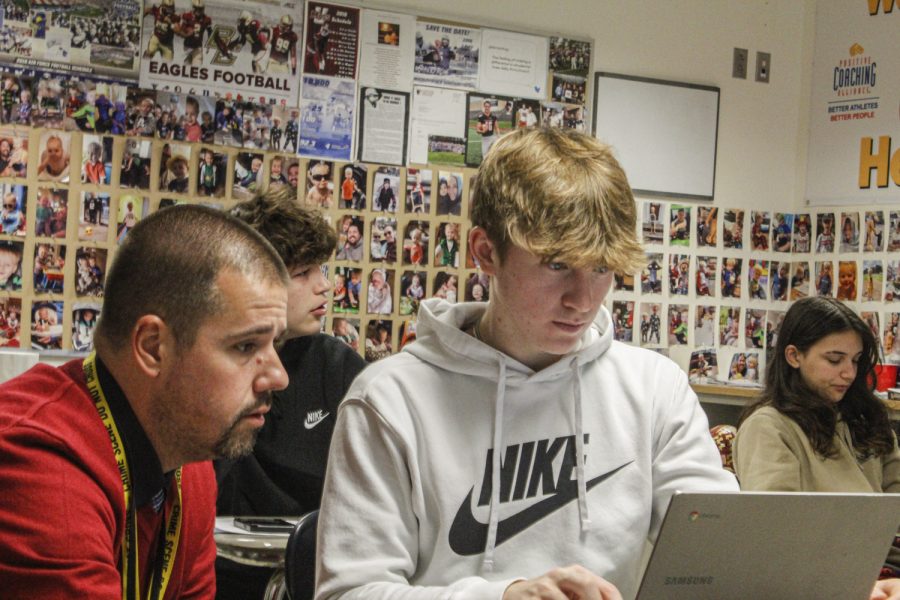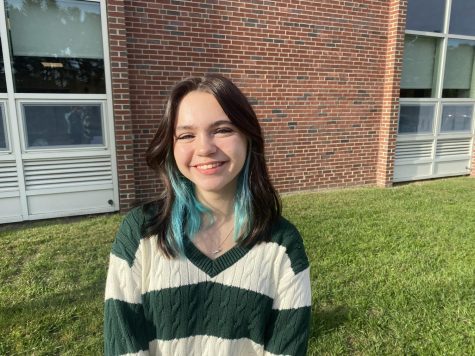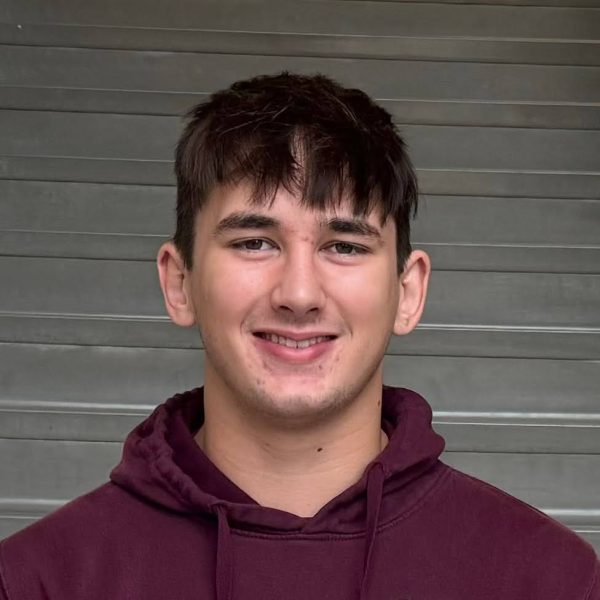Unleveled and mixed level courses encourage community, diverse learning
Freshman Cooper Veron receives help with his online work in US History I teacher Justin Mckay’s classroom. US History I is an unleveled course.
February 17, 2023
Algonquin predominantly offers leveled courses, but still offers the opportunity to take mixed-level and unleveled courses which can foster additional academic benefits by allowing students to grow and learn together.
Algonquin often relies on the tradition of ability-based grouping, creating levels that are designed to reflect students’ skill level. These levels would fall into three categories, college prep, honors, and advanced placement (AP). However there are several exceptions to this norm; all freshmen are enrolled in unleveled United States History I, and there are various mixed-level electives as well as open honors-level courses offered. An unleveled course is a class open to all where students will receive college prep credit, a mixed-level elective course is one that has students taking the class at an honors level and college prep.
According to Principal Sean Bevan, leveling can unintentionally open the door to many challenges.
“[Leveled classes] can really stifle a student’s growth sometimes,” Bevan said. “It can make a student feel like they are only a certain level or ability and that it’s a fixed feature of their personality and strengths, and not something they can grow through.”
According to the 2021 Novak Education article, “What You Need to Know About Deleveling,” ability-based level courses potentially facilitate a system that can eliminate the possibility for students to learn in a diverse classroom, preventing many learners from accessing advanced coursework with their peers.
Novak Education explores the New York Rockville Centre Union Free School District’s exigence in deciding to delevel their courses. According to the article, in deleveling, “The intent is to keep all students, regardless of strengths, needs, and identity in courses together. These inclusive classes have the same high expectations for all learners.”
In recent years, many courses offered at Algonquin have experimented with deleveling, aiming to create a more inclusive environment– a safe space for all students to thrive.
During the 2018-2019 school year, the U.S. History I course underwent a drastic curriculum change and switched to an unleveled class, prioritizing skill-based learning experience opening potential pathways for students. U.S. History I teacher Kristen Turner believes the course emphasizes the potential successes of unleveled classes.
“We [U.S. I teachers] were focused on providing an equitable place where kids can all succeed,” Turner said.
In the Social Studies department, all electives are stand-alone courses that are only offered at the honors level, but are open to everyone without a prerequisite. Department Head Brittany Burns prioritizes equity and access for these courses, as she believes it is important that all students have access to high level, rigorous curricula.
“[Members of the Social Studies department] felt like, with those courses in particular, what was most important was the level of interest,” Burns said. “It is more about meeting standards and looking at personal growth rather than a specific criteria or level.”
According to Burns, before adapting the electives to be open honors-level courses, the college prep level electives would often not receive enough interest to run during any given semester. Thus, many students would miss out on learning about a topic they were interested in.
“It is important to offer opportunities for all students to learn and to succeed and to show their knowledge and growth,” Burns said.
Another new practice that challenges the tradition of leveled classes is that of mixed-level courses. After many years of Journalism running as two separate honors and college prep courses, it has now been taught as a mixed-leveled course for several years. Students taking it at a college prep or honors level are in the same class.
“Leveling has a lot to do with self-perception,” Journalism teacher Lindsay Coppens said. “For the students who are traditionally honors-level students, it is beneficial to have an opportunity to be in a class with students who have different experiences and viewpoints, and vice versa.”
Having a combined class is the best of both worlds according to Coppens. It allows her to teach the same content and skill building material, while having the ability to be flexible with certain students if need be.
“The offering of the levels gets them in the door,” Coppens said. “Once they’re in the room it provides them the ability to make the choices that are best for them as learners.”
Other English electives such as Silenced Voices and Creative Writing have also been taught as mixed-level classes. According to English Department Head Jane Betar, the philosophy of unleveling and mixed-level classes is a conversation currently being discussed by other teachers in the English department.
“I’d be really curious to have a team of teachers study [unleveling freshman year] a little bit more and see what happens if we put it into place,” Betar said.
Freshman English teacher Rebecca Pratt is very familiar with the course and believes that unleveling should be heavily considered for the future to ease students into the transition to high school.
“Unleveled courses give a more even playing field to allow students to get used to high school,” Pratt said. “I think having a mix of students is good for all students to engage with different personalities and abilities across the board.”
Deleveling has the chance to open the doors to opportunities many students never thought they’d have the chance to before.
“The research has shown that students do well in unleveled classes, and we were happy to test that out and for it to be true,” Turner said. “We have found there to be no drawbacks and only benefits.”











